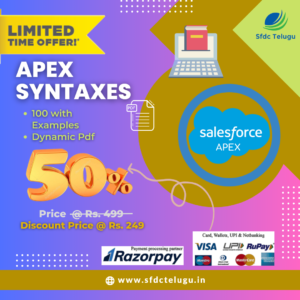Our Salesforce Apex Development Course is designed to guide you through all key aspects of Apex programming. Whether you’re a beginner or looking to enhance your skills, this course offers a structured learning approach from fundamental to advanced topics.
Apex Classes & Variable Declaration
Learn the foundation of Apex by understanding how to declare variables and define classes. You’ll explore local and global variable scopes while working with both primitive and non-primitive data types. Understand how classes are structured and organized within Salesforce.
Constructors
Constructors are essential for initializing objects. In this section, you’ll discover how to define constructors and pass values through parameterized constructors, helping you efficiently create and configure objects.
Methods, Return Types & Method Calling
Explore the role of methods in Apex programming. You’ll learn how to define methods, specify return types (such as void, primitive, or custom objects), pass parameters, and call these methods within or across classes.
Primitive & Non-Primitive Data Types
A solid understanding of data types is crucial in any programming language. Learn to work with primitive types (e.g., String, Integer, Boolean) as well as non-primitive types (sObject).
Apex Class to Another Apex Class
In this section, you’ll dive into how to reference and interact with one class from another. This ensures modularity and reusability, key concepts in writing efficient and scalable code.
Utility Methods & Inner Classes
Utility methods are reusable functions that can be used across different parts of your application. You’ll also explore inner classes, understanding when and how to use them to group related logic inside your main classes.
SOQL (Salesforce Object Query Language)
Learn how to interact with your Salesforce data through SOQL. This section covers writing efficient queries to retrieve records, as well as best practices to optimize query performance.
DML (Data Manipulation Language) Operations
Discover how to modify Salesforce data with DML operations. You’ll learn how to use INSERT, UPDATE, DELETE, UPSERT, and MERGE to create or modify records. Additionally, you’ll explore how to manage transaction control using Database methods to ensure data integrity.
Conditional Logic
Apex allows for dynamic decision-making through control flow structures like if-else statements, switch cases, and loops. You’ll learn how to handle various conditions and apply logical operators for more complex operations.
Collections in Apex
Collections allow you to store and manipulate multiple records. You’ll work with Lists, Sets, and Maps to efficiently manage data, including performing operations like sorting, filtering, and iterating through these collections.
Static Keyword & Static Variables
The static keyword in Apex allows you to define methods and variables that are shared across all instances of a class. In this section, you’ll explore the use cases for static methods and variables and how to apply them effectively in your applications.
Triggers
Apex Triggers are essential for automating business logic when records are created, updated, or deleted. You’ll learn how to write triggers that respond to DML events (before/after insert, update, delete) and handle bulk processing of records to maintain Salesforce best practices.
Asynchronous Apex: Future Methods & Batch Apex
Handling long-running and resource-intensive processes is critical in Salesforce. This section covers Future methods for asynchronous execution and Batch Apex for processing large volumes of records. You’ll learn when to use each approach and how to optimize performance.
Apex Testing & Test Classes
Ensuring your Apex code is robust and deployment-ready requires writing unit tests. You’ll learn how to create comprehensive test classes, covering various test scenarios, bulk testing, and mocking to ensure that your code passes Salesforce’s rigorous testing standards.
By the end of the course, you’ll have a strong understanding of Salesforce Apex development, with the ability to write efficient, scalable code that interacts with your Salesforce data. Whether you’re building complex logic, automating processes with triggers, or ensuring data integrity with DML, this course provides everything you need to succeed as a Salesforce developer.




